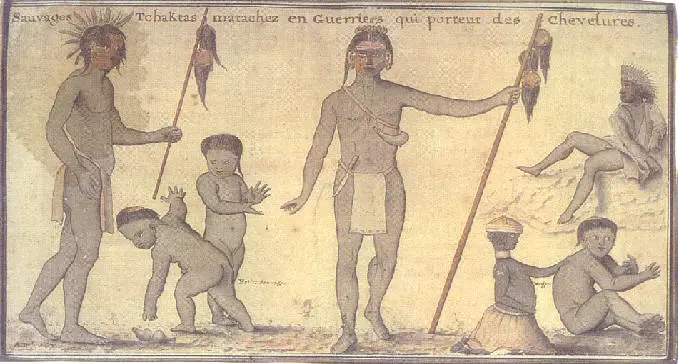Choctaw Exile
The Choctaw were one of many Native Indian tribes that were affected by the Indian Removal Act of 1830.
While the law was supposed to be for voluntary relocation of Native Indian tribes, the prejudice that President Andrew Jackson had against Native Indians led him to force tribes out of their homelands and into new and less habitable areas.

- The Choctaw Native Indian tribe lived in the southern and middle of the Mississippi River area for what is thought to be thousands of years, even tracing their ancestry back to parts of Florida. The culture of the tribe included developing corn crops (called maize) that were the basis of their survival, mound-building, success as agriculturists, and developed a written language. The Choctaw tribe originally welcomes the European explorers as well as Africans that they were introduced to. Their acceptance of the customs of the white Europeans led them to be part of the Five Civilized Tribes.
- As settlers moved into new lands a majority of the Choctaw tribe supported the original thirteen colonies. Many of the Choctaws had adopted Christianity as well as intermarried with the English settlers and adopted the culture of the white Europeans.
- The Choctaw tribe signed nine treaties with the U.S. Government, with the last one being part of the voluntary relocation of the tribe from their homelands to the areas west of the Mississippi River. They were the first tribe to sign the Indian Removal Act treaty and Jackson wanted to make the exile of the Choctaw the example of the perfect relocation.
- There wasn’t any plan to relocate any of the Native Indian tribes and instead they were forced to walk what is known as the Trail of Tears. The Choctaw began with almost 17,000 members and along the way around 2,500 died as they walked and carried their families to what is now Oklahoma.
- The treaty did provide a clause that allowed the Choctaw to stay in the Mississippi homelands if they chose to become citizens of the United States. This would mean that they would lose the protection of being part of a sovereign nation and instead be subject to the state and federal laws. There were around 5,000-6,000 Choctaw natives that selected to remain. However, their exile from their tribe wasn’t a good one. They continued to be harassed, bothered, and intimidated by the white settlers in the communities.
- Since there were now two recognized tribes of Choctaw, those that remained in their homeland were called the Mississippi Band of Choctaw Indians and those that relocated were called the Choctaw Nation of Oklahoma.
- Those that had voluntarily relocated to Oklahoma were a generous and kind people and once they arrived they drafted their own constitution and built a church and a school.
- The Civil War brought about both tribal groups siding with the Confederate States because they remembered in anger how they were treated by the Federal Government and forced off their land or to stay and lose their sovereign nation status.
- The introduction of the railroad after the Civil War allowed what is called the Land Run of 1889. New white settlers showed up in massive numbers causing murders, thefts, and violent crimes. The struggles continued until the U.S. Government created the Dawes Commission which was to end the commonly held tribal lands and instead give specific land to members of the tribes. The problem with this is that the government wouldn’t let the members be in charge of their own land for sale or trade because they said that the Native Indians weren’t smart enough. The results of this is that many of the Native Indians lost their land when government officials ruled against them.
Q&A:
What were the names of the two Choctaw Native tribes?
Mississippi Band of Choctaw Indians and Choctaw Nation of Oklahoma
How many of the Choctaw Native Indians died on their walk in the Trail of Tears?
2,500
Why did the Choctaw Indians fight on the side of the Confederates during the Civil War?
They remembers the bad treatment of the U.S. Federal Government in making them leave their homeland
What did the introduction of the railroad cause in Oklahoma that affected the Choctaw?
The Land Run of 1889
Which U.S. President was prejudiced against Native Indians?
Andrew Jackson
Why were the Choctaw included in the “Five Civilized Tribes?”
Their acceptance of the customs of the white Europeans



